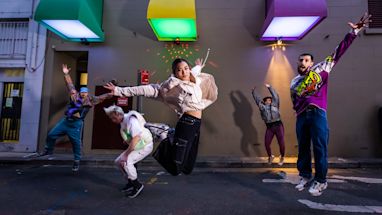We are living in a time of constant pronouncements of inevitable and revolutionary technological change. Experts declare that artificial intelligence is replacing humans, and meanwhile prepare to populate Mars in search of a better life. If this is what we consider progress, who is it for?
Galit Ariel, who in 2022 was named one of 40 most influential futurists by Forbes, has some curly questions. She wants to talk about the good, the bad and the weird of our technological civilisation. Ariel asks if we are setting ourselves up for the type of lives and future we want or is profit dominating technological development?
You can join Ariel at our Visiting Entrepreneur Program at venues across the Tech Central precinct from 21 to 28 June. The self-proclaimed lover of tech challenges the narrative of endless technological progress and calls for a refocus on the social good.
With innovation comes responsibility
Ariel is a leading researcher and creator of augmented reality and other spaces designed for human experience.
“I make sure I balance the grimmer horizons and realities with the good, and oftentimes weird ways humans shape our culture through technology,” she said.
“It’s easy to think of technology as something that just happens. A lot of creators don’t think about their accountability – they might say, ‘I just made a code,’” Ariel said. What we design and put out into the world has real implications, for users and society.
Ariel is joined by 4 global experts who’ll dissect the accountability, ethics and impact of emerging tech across 9 free events at this year’s Visiting Entrepreneur Program.

Tech-haves and have-nots: A growing divide
Escaping the digital loop is becoming almost impossible. Our behaviour on social media can impact our ability to get a job, enter a country or find a date. What’s more, technology requires financial and other resources and skills that are unevenly distributed. There’s a growing divide between the tech-haves and have-nots.
“We don’t admit that technology is a human right or a social common. In fact, we pay for it as both the user and the product, if we consider the monetary value of our attention,” Ariel said.
Tech industry giants have immense power. I don’t remember voting for Mark, Elon or Jeff and yet they make enormous social decisions on our behalf.
Looking back to better understand the present, Ariel said that the idea of technological progress comes with a price. In a rush for cheaper and faster technology, we accepted progress comes at a cost to our planet, bodies and culture.
Consider quantified-self technology. This is where, for example, a wearable device measures a body’s temperature and moisture levels to tell the user they’re thirsty. Could the long-term effect be that we lose connection to our own bodies?
Pause entertainment and get back to basics
While much media and political attention goes to AI chatbots such as ChatGPT, socially important technology goes undetected.
“Algorithmic learning has been around since the 1970s, it is the basis of digital computers. While ‘genies inside the computer’ such as ChatGPT are lauded as revolutionary, they lack 2 fundamental aspects: context and process,” Ariel said.
Who is winning? The creator of the chatbot OpenAI himself has called for regulation of his own product!
On the other hand, we have deep tech creating solutions for food shortages, fighting disease and climate change. Agricultural technology for indoor farming is working to understand real-time soil fertility, create nutritional crops and find solutions for food distribution. This could be where developers and investors direct their attention.

Sydney tech as agent of change
And her message to our local tech ecosystem? Ariel wants Australian developers and entrepreneurs to ask what kind of legacy they want to leave behind. Socially beneficial technology and profit aren’t mutually exclusive.
“Mass distribution and getting to market quickly is overbalanced. You are a person affected by technology, a member of society, possibly the parent of the future recipients of what we create today. Ask: what’s in it for us as a society?” Ariel said.
Also, much like other tech ecosystems outside of Silicon Valley, Sydney should reflect on how it’s differentiated from everywhere else.
Think about how you’re working with and serving your local community. Stop surrounding yourself with tech people only or you’ll end up in an echo-chamber.
Hear more about tech hype and disruption
Join Ariel at The tech we all deserve on 21 June.
Her talk is part of the opening event for our Visiting Entrepreneur Program, a series of free events where global and local experts explore the latest technological trends and innovations. Under the theme of Crossroads, this year’s speakers explore the tensions between hype and disruption.
“Our program this year is an invaluable opportunity for local entrepreneurs to gain a deeper knowledge of the global tech landscape and learn from the experts as we move towards a future with the biggest technology advances of our time,” Sydney Lord Mayor, Lord Mayor of Sydney Clover Moore AO said.
Keep an eye out for:
Advancing climate innovation through collaboration and AI | 21 June in Barangaroo, with Lubomila Jordanova, CEO & Founder of Plan A
Hypergrowth & AI: spotting opportunity through the noise | 22 June in Sydney, with Chris Yeh, Co-founder of Blitzscaling Academy & Blitzscaling Ventures
The future happened yesterday - a story of tomorrow | 26 June in Ultimo, with Galit Ariel, TechnoFuturist
Responsible AI: getting it right | 28 June in Haymarket, with Dona Sarkar, Director of Technology, Microsoft Accessibility
Discover the full program, ranging from artificial intelligence, sustainable solutions, the quantum world to scaling innovations, inclusion and other ethics. The Visiting Entrepreneur Program is produced by the City of Sydney with partner organisations from the local startup ecosystem. The 2023 edition is kindly supported by Tech Central and the Greater Cities Commission.
Published 5 June 2023, updated 29 February 2024



